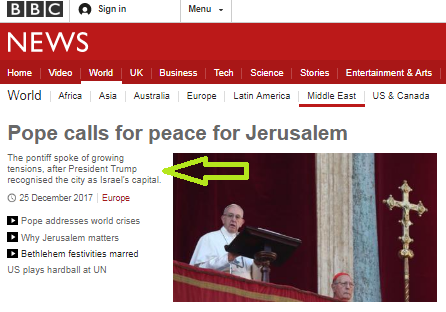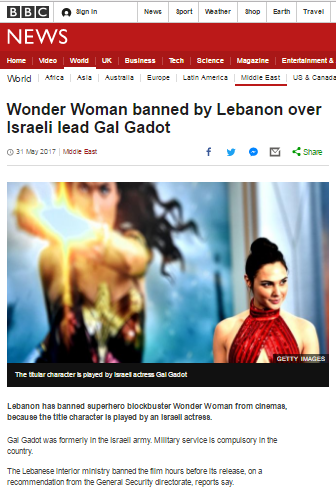As has been noted here on numerous occasions, the BBC has made little serious effort to inform its audiences on the issue of the part played by social media in fuelling the wave of terrorism seen in Israel during the past nine months.
In October 2015 the BBC News website produced a backgrounder headlined “Is Palestinian-Israeli violence being driven by social media?” which did very little to inform readers of the scale and significance of the incitement spread via social media, of the kind of content appearing on such platforms or of the use of social media by official Palestinian groups other than Hamas – including Mahmoud Abbas’ Fatah party – for incitement and the glorification of terrorism.
Against that background, BBC audiences recently found two articles on the corporation’s website relating to the topic of Palestinian incitement of terrorism against Israelis on Facebook.
On July 4th BBC Technology published a report headlined “Israel angered by Facebook hatred rules“.
“Government ministers in Israel have accused Facebook of failing to tackle “inciteful” posts against the country on the social network.
Public security minister Gilad Erdan said Facebook had set “a very high bar for removing inciteful content”.
Justice minister Ayelet Shaked wants social media companies to pre-emptively remove content which Israel considers to be a security threat.
Facebook said it worked closely with Israel to tackle threatening content.
Mrs Shaked has complained that threatening content must be manually reported by the website’s users before any action can be taken.
“We want the companies… to remove posts by terrorist groups and incitement to terrorism without us having to flag each individual post, in just the same manner, for example, that they today do not allow posts and pages with child pornography,” she told Israel’s Army Radio.”
The issue of incitement to terrorism, antisemitism and hate speech on social media was of course recognised long before the wave of terror began in October 2015, with the problematic fact that Facebook relies on members of the public to flag up offensive posts having been previously raised at the 2015 Global Forum for Combating Antisemitism. As the BBC’s article correctly notes, Israel is of course not the only country to have concerns about such issues and the UK is no exception. However, Israel does face one rather unique situation which the BBC’s article does not explain:
“Defending his legislation, Erdan said European countries such as France and Germany already have similar laws in place, and Facebook complies with them. Yet, according to a spokesman for the minister, Facebook recently agreed to remove just 23 out of 74 pages brought to its attention by Israel for spreading Palestinian incitement. “Their policy of removing [content] is very, very, very strict and the bar is set very high,” the spokesman told The Times of Israel.
Facebook also does not recognize Israeli control in the West Bank, the spokesman added. “More than that, if someone writes something problematic and they live in Judea and Samaria, they [Facebook] won’t cooperate with us and they say it’s outside of Israel and therefore they can’t cooperate,” he said. Facebook declined to comment on this allegation.”
On July 11th visitors to the BBC News website’s Middle East page found an article titled “Facebook sued by Israeli group over Palestinian attacks“.
“An Israeli rights group is suing Facebook for $1bn on behalf of families of victims of Palestinian attacks.
The Shurat Hadin group says Facebook violates the US Anti-Terrorism Act by allowing militant groups such as Hamas a platform for spreading violence.”
Later on in the article, readers were told that:
“A report on the Israel-Palestinian conflict last week by the Quartet group of international mediators identified “the spreading of incitement to violence on social media” by Palestinians as a key issue.
“Hamas and other radical factions are responsible for the most explicit and widespread forms of incitement. These groups use media outlets to glorify terrorism and openly call for violence against Jews, including instructing viewers on how to carry out stabbings,” the report said.”
Nevertheless, the BBC found it appropriate to include amplification of the response of a terrorist organisation, which has long used social media for the propagation of terrorism, in its report.
“Hamas called the lawsuit an Israeli attempt to blackmail Facebook. […]
Sami Abu Zuhri, a Hamas spokesman in Gaza, accused Israel of trying to turn it into a spy tool against Palestinians.
He said some Israeli politicians and soldiers had “expressed pride at the killing of Palestinians” on Facebook and other social media.
“The real test for the owners of Facebook is to reject this pressure,” he said.”
And readers were told that:
“Israel says Palestinian incitement on social media has fuelled a wave of attacks since October, which have killed 35 Israelis and four people of other nationalities.” [emphasis added]
Obviously audiences’ understanding of the context to these two reports (and others) would have been greatly enhanced had they previously been adequately informed of the scale and nature of incitement on Palestinian social media and the use of such platforms by official Palestinian groups and bodies as well as individuals. That of course has not been the case and so the corporation’s funding public continues to lack key facts in a developing story the BBC has had over nine months to tell in its own words – but has not.
Related Articles:
BBC backgrounder manipulates audience perceptions of wave of terror in Israel
Revisiting the BBC’s ‘explanation’ of the current wave of terror
Global Forum for Combating Antisemitism 2015
BBC’s account of Quartet report exposes the holes in its own narrative




